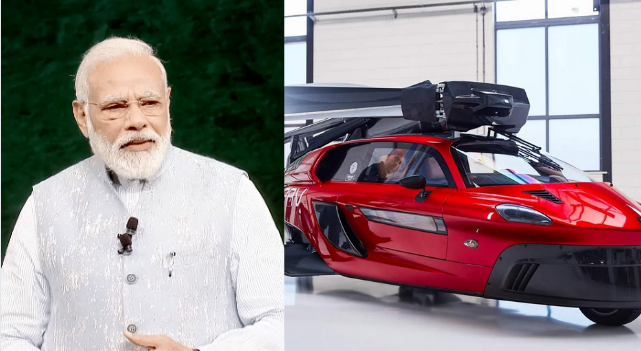In a major push for Modi government’s flagship ‘Make in India’ initiative, world’s first flying car is likely to be manufactured in the state of Gujarat. Dutch flying maker, PAL-V (Personal Air Land Vehicle) has set a target of commencing production of the futuristic vehicle in Gujarat by the year 2021.
A Memorandum of Understanding (MoU) has also been signed between the Gujarat Industries Principal Secretary MK Das and PAL-V Vice President (International Business Development) Carlo Maasbommel, in the presence of Chief Minister Vijay Rupani.
A release stated that the Gujarat government would help the flying car maker based in the Netherlands to get all necessary approvals from the Centre for the ambitious project.
Explaining the details of the project, Carlo Maasbommel said, “The PAL-V flying car, having two engines, can run at a speed of 160 kilometres on road and can fly at a speed of 180 kms. The car can turn into a flying vehicle in just three minutes and cover a distance of 500 km on a full tank.”
As India is all set to be the country where the world’s first flying cars may be manufactured, PM Modi’s flagship intiative- ‘Make in India’ has got a major shot in the arm. The initiative which was launched by the Prime Minister months after coming into power in the year 2014, seeks to make India a global manufacturing hub capitalising upon the demographic dividend and low per capita income (thus cheap labour).
Last year, the Modi government pushed the flagship initiative even further by slashing corporate tax rates. The corporate tax for established units was slashed by one fourth (30% to 22%) and for new manufacturing units that start production before March 2023, the rate was brought down to 15%.
The move was timed shrewdly keeping in mind the tariff war between China and the United States. With companies fleeing China, New Delhi wants to accelerate their entry into India by offering one of the most favourable corporate tax regimes among the Asian economies.
The fact that PAL-V chose India for manufacturing the flying cars shows that the move to slash the Corporate Tax rates has paid off well. What it also vindicates is PM Modi’s Gujarat model that his detractors often try to undermine.
In fact, the Gujarat model has also won praise of the PAL-V Vice President Maasbommel who said that his company chose Gujarat for its “world class infrastructure, ease of doing business and better port and logistic facilities”. He also told Chief Minister Vijay Rupani that as of now PAL-V has already received orders to export 110 such flying cars.
The state of Gujarat indeed offers the highest level of physical infrastructure in India. In all major attributes relevant to global manufacturing companies such as road density, electricity generation, low crime rate, etc. Gujarat is right at the top. PM Modi was the Gujarat Chief Minister for 12 years and it was his highly successful Gujarat development model that propelled him to power in Delhi. The development model stands strongly vindicated all over again.
According to Maasbommel, the flying cars manufactured in the state of Gujarat would also be exported to other countries, including the United States and the European nations. Therefore, Gujarat would emerge as the manufacturing hub of the futuristic flying cars.
PM Modi’s ‘Make in India’ initiative has thus received a major impetus, even as India is set to become the centre of the next global revolution in the automobile sector.
